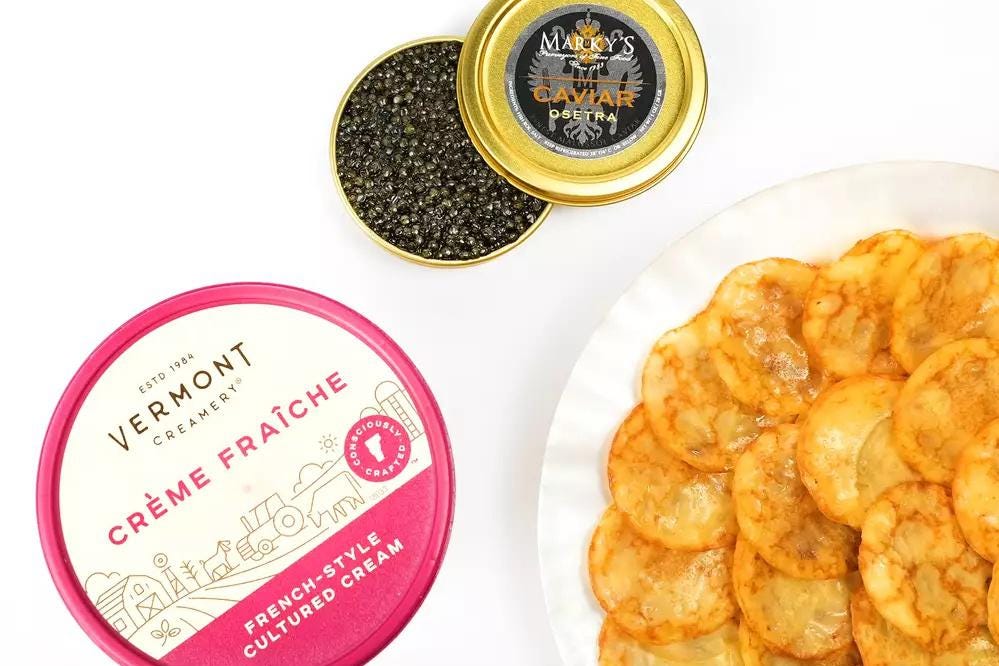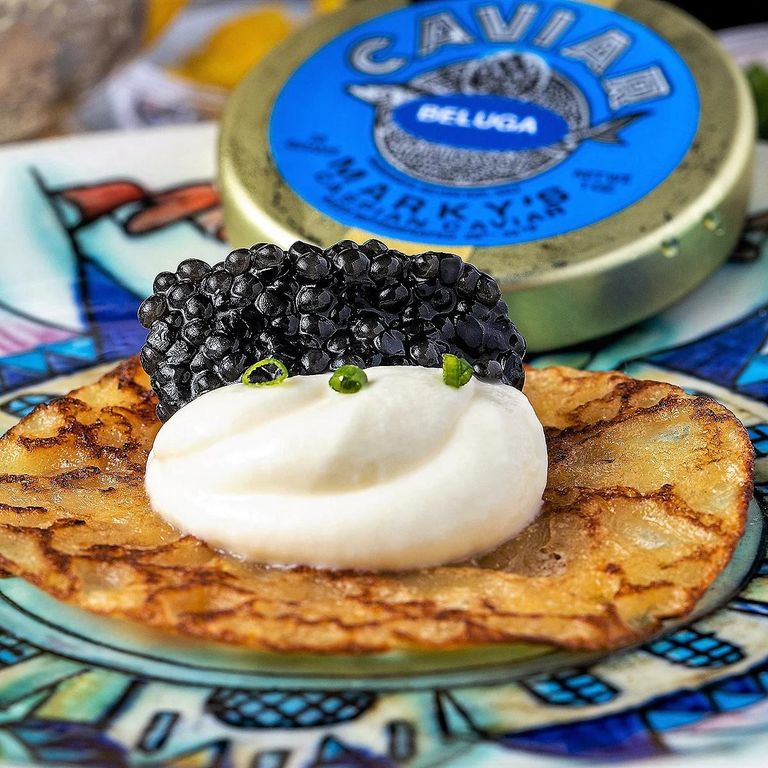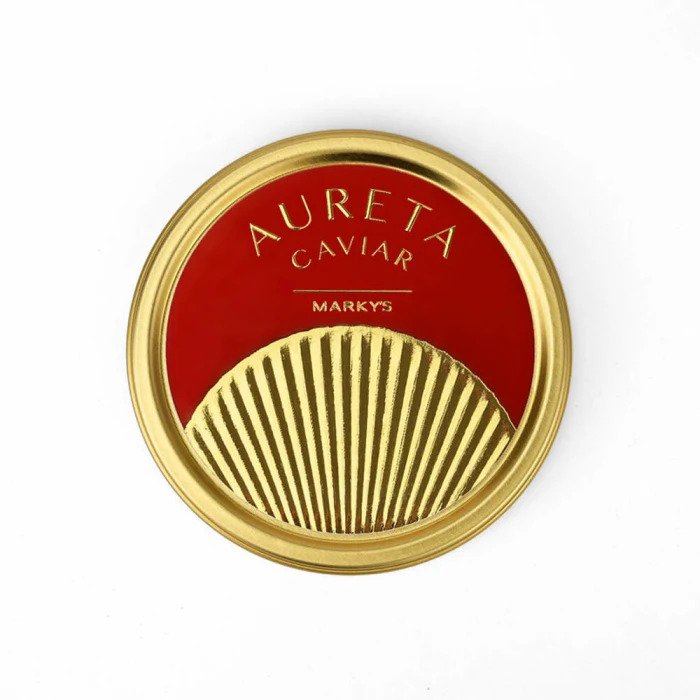Economy, dwindling fish hamper caviar industry
Category : Food Stories, Party Ideas, Recipes, Press Room |
Posted : Jun 17, 2003
EXCLUSIVE REPORTS
Economy, dwindling fish hamper caviar industry
John T. Fakler
Posted on Monday, June 16, 2003

The caviar business in South Florida is sleeping with the fishes.
Caviarteria, which has caviar restaurant and shops in Boca Raton and Palm Beach, closed in Miami Beach; New York; Beverly Hills, Calif.; and Las Vegas.
Other local caviar establishments are listed as inactive in Florida, according to state records, and those in business face a tough road ahead amid a shaky economy, crackdown on illicit imports and a dwindling supply of black eggs from endangered sturgeon.
Marky's Caviar in North Miami Beach is so concerned it is attempting to farm raise Caspian sturgeon domestically.
"The economy is not very good," said owner Mark Zaslavsky, who acknowledged an industrywide slowdown in demand.
Despite the dwindling numbers of sturgeon, supply from producers is not a problem, as 45 to 50 tons of caviar cargo will be available this year, he said.
Setbacks at Caviarteria
One of the major players in the caviar business has been Caviarteria, opened by Louis Sobol in New York City in 1950.
A January 2000 Business Journal article told how the late Sobol's sons, Eric and Bruce, were planning to open their seventh location, on South Beach.
"In the South Florida region, we have 2,500 existing caviar customers," Eric Sobol said. "We do a major amount of business with South and Latin Americans, and Miami is obviously the gateway to Latin America."
But even after it opened, the place never took off, co-owner Bruce Sobol said recently.
"It wasn't really selling caviar," he said. "We like the drinks and the youths, but it really wasn't who we are."
Caviarteria South Beach dissolved in October, according to Florida state records. Also gone are New York City locations in Grand Central Terminal and the SoHo Grand Hotel.
In fiscal 2001, the company lost $2 million, according to court filings cited by The New York Times in a Jan. 20 article.
Eric Sobol, Bruce's brother, committed suicide in his car in the parking lot of a restaurant in Danville, Pa., on April 16, 2001, the Times' article said. His widow said he committed suicide so life insurance policies would cover the company's debts.
Bruce Sobol, who has battled his brother's widow in court, said he has closed all locations except Boca Raton and Palm Beach, but plans for eateries in Aspen, Colo.; Chicago and Seattle may still be realized.
"We're working on re-opening the Las Vegas location," he added. "Boca [Raton] is doing pretty well."
Making the grade
Caviarteria has also been caught up in another industry problem - the watchful eyes of U.S. Fish and Wildlife agents who have seized shipments and led to Justice Department prosecutions.
In 1999, the Wildlife Service seized four shipments of black eggs from Caviarteria after DNA testing said it was underrated, according to a 1999 New York magazine article. A likely motive for mislabeling caviar would be to hide its identity as coming from an endangered species.
"That means our Russian suppliers have given us merchandise worth double what they charged us," Eric Sobol told the magazine. A new round of DNA testing performed at the American Museum of Natural History showed the caviar was not mislabeled, he said.
Those findings were introduced into evidence in Brooklyn Federal Court after Caviarteria sued the service for $100 million and a ton of rotting caviar was kept as evidence.
Two file boxes containing documents from Sobol's lawsuits challenging the seizures and DNA testing process were still at the Federal District Courthouse in Brooklyn earlier this year, the Times reported.
Smuggling in the catch
Sturgeon fisheries in Russia, widely reported to be controlled by the Russian mob, have shrunken dramatically, leading to poaching and an increase in organized crime, according to media reports.
In a scene reminiscent of a James Bond caper, a Miami-based ring used paid couriers to smuggle caviar in suitcases.
Last August, The Department of Justice announced that Viktor Tsimbal, president of Beluga Caviar in North Miami Beach, pled guilty to a "far-reaching" wildlife smuggling conspiracy.
Couriers brought suitcases filled with caviar into the United States, the DOJ said after new international restrictions were announced in 1998 to protect sturgeon.
Tsimbal, a Russian national, pled guilty to conspiracy, smuggling and money laundering charges contained in an indictment returned by a Miami grand jury on June 2, 2002.
He also admitted to using false documents to smuggle more Beluga caviar from Russia into the United States via Poland in 1999 than the entire Russian export quota for the year, according to court records.
Tsimbal, according to the DOJ, orchestrated a conspiracy in which smugglers were paid approximately $500 for each trip and were provided airline tickets, pre-packed luggage filled with black market caviar and apartment and hotel rooms in Europe and Miami.
A federal jury also convicted Mikhail Ivanovich Kovtun, also a Russian, of illegally importing and transporting 98.2 pounds - worth $1,000 a pound - of Russian-origin caviar after arriving at Miami International Airport Aug. 23, 2001, on a flight from Moscow via Zurich, Switzerland.
He was also convicted of making false statements to the Customs Service and for a violation of the Endangered Species Act.
The convictions are possible under an international treaty inked April 1, 1998, that protects all species of sturgeon and their derivatives, including roe, under the Convention on International Trade in Endangered Species of Wild Fauna and Flora.
DNA analysis conducted by the U.S. Fish & Wildlife Service Forensic Laboratory for the trial established that the roe smuggled by the conspirators was sturgeon caviar. Other fish that provide caviar include salmon, paddlefish and whitefish.
This was the eighth conviction in Miami involving caviar smuggling between November 2000 and November 2002.
Tom Sansonetti, assistant attorney general of the Justice Department's Environment and Natural Resources Division, said the department will continue to enforce laws designed to protect and preserve sturgeon from the threat of extinction.
Caspian Sea sturgeon may have been around since the age of dinosaurs, Sansonetti said, adding that "the appetite of smugglers for profit has the potential to extinguish them from the Earth."
"Recent prosecutions have shown that the caviar trade is rife with corruption," he said.
Sturgeon can live up to 100 years. Because the time necessary to reach egg-bearing age can be up to 20 years - and the fish is killed in the process of obtaining the roe that is salted to make caviar - sturgeon are especially vulnerable.
Bleak outlook
A major threat to the survival of the sturgeon is the trade in black market caviar smuggled from Russia and other Caspian Sea nations, the DOJ said.
Over the past two decades, the Caspian's beluga sturgeon population has dropped significantly due to environmental degradation, invasion of exotic species and over fishing.
This decline has prompted companies like Marky's Caviar to take steps toward relieving the pressure on the world population of sturgeon, supplementing the wild catch with farmed caviar.
Marky's, which imports Russian caviar from the Black and Caspian seas, said it hopes to develop domestic stock of Caspian beluga sturgeon by setting up its own fish farm.
Until now, American aqua farms have mostly produced paddlefish roe or California white sturgeon varieties of caviar, which have their own distinct flavor.
Last week, at the Lufthansa terminal at Miami International Airport, Marky's announced it has become the first U.S. company to transport five live beluga sturgeon.
"We are the only one," said Zaslavsky, noting there are only six beluga sturgeon in the United States - its five and one male at the University of Florida. "I called today to see how they are. The fish are eating."
The co-owners literally slept with the fishes, accompanying the sturgeon on a plane ride overseas.
The imported beluga, weighing between eight and 10 pounds each, will serve as the brood stock for Sturgeon Aquafarms, an aquaculture facility to be built near Orlando, the company said.
"Any sturgeon is very important in that we take pictures of the cans, the boxes, we even go to the length of random sampling," said Cindy Ferrer, a wildlife inspector on hand for the delivery. "It is something we handle very seriously here."
Ferrer said it was the first time in her three years in Miami that she's encountered imported sturgeon to be farm-raised domestically.
"They [Marky's Caviar] handled the logistics of handling the fish," she said. "I checked quantity and completed the species inspection as normal."
E-mail Senior Reporter John T. Fakler at This email address is being protected from spambots. You need JavaScript enabled to view it..














